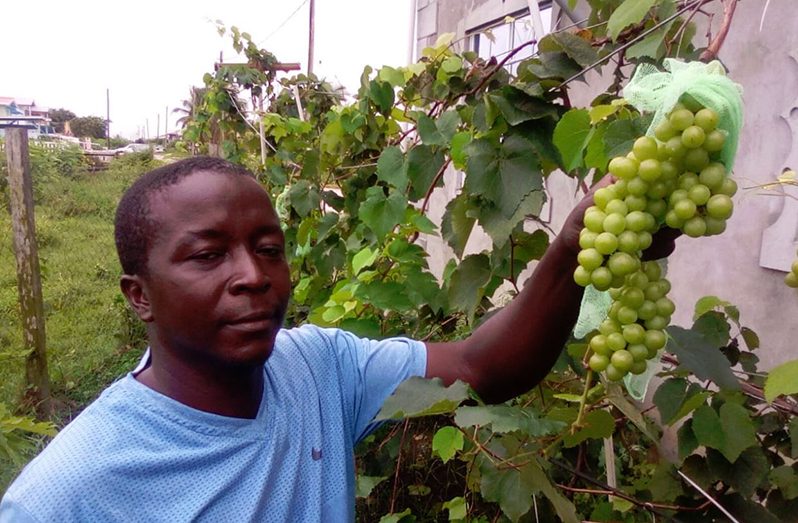AS a boy, Devon Gilead fondly remembers a neighbour who would travel overseas and return with apples and grapes. His family would be given an apple and four grapes, which had to be shared among his siblings. Dissatisfied with having just a grape, he endeavoured to one day own a grapevine, where he could have as many as possible.
Many years later, Gilead, would have sought advice from agriculturalists, but was told that the fruit could not be grown in the tropics, but in cool temperature areas.
He was determined to prove them wrong. After conducting extensive research, he discovered that the contributing factor for a successful grape harvest was the ph. factor of the soil. The soil ph. is measured by the alkalinity or acidity of the soil. A ph. of 5.5 to 7.0 is generally recommended for grapes.
Despite criticism of his plan, Gilead, who has no formal training in agriculture, singlehandedly started his cultivation with a few grape cuttings, brought by a friend, from overseas. A plot of land at his Lot 649 Glasgow New Housing Scheme, East Bank Berbice home was prepared and from then, there was no looking back.
He had expected the flowering of the vines after 24 months but was pleasantly surprised that the vine flowered at just eight months, followed by bunches of red globe, a succulent seeded grape, the largest round berry of all grapes. They have a dark ruby red colour and are mildly sweet and flavourful when ripened.
Grapes have been shown to fend off artery hardening, reduce blood pressure, improve circulation, curb blood clotting and lower inflammation. Research indicated that grapes also help reduce cholesterol by decreasing the absorption of the compound into the blood.
Byproducts of grapes are raisins, wine, juice, vinegar, oils and sweet spreads such as jams, jellies and marmalade.
The average lifespan of a grapevine is twenty five years but are actually capable of producing grapes for more than 100 years. According to Guinness Book of World records in 2010, the oldest living grapevine as proven by genetic testing is located in the Solvenian City of Maribor. The age of the vine is confirmed to be over 400 years.
Gilead would be grateful if he is afforded the opportunity to get government lands to expand his cultivation. Cultivating of non-traditional crops is nothing new for him. His yard space is filled with cauliflower, purple cabbage, peanuts, sweet potatoes, peppermint, dragon fruit, jackfruit and other traditional plants, along with apple, strawberry, blueberries, raspberry and other seedlings.
Gilead, popularly known as “Bee Man”, loves the soil and believes that his hands are blessed to cultivate. He has grapevines for sale and has expressed a willingness to assist persons who are interested in its cultivation.
He is of the opinion that abandoned sugarcane fields can be transformed into vineyards which will be beneficial to Guyana for generations to come.
Gilead can be contacted on 661-9766.




.png)









